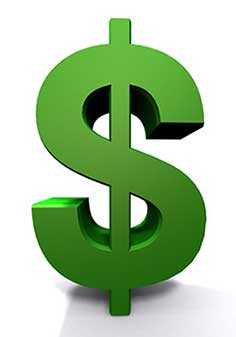Related Topics
Investing, Philadelphia Style
Land ownership once was the only practical form of savings, until banking matured in the mid-19th century. Philadelphia took an early lead in what is now called investment and still defines a certain style of it.
Whither, Federal Reserve? (1) Before Our Crash
The Federal Reserve seems to be a big black box, containing magic. In fact, its high-wire acrobatics must not be allowed to fail. Nevertheless, it may be time to consider revising or replacing it.
Supply-Side Tax Cuts

|
| Dollar Sign |
Some tax cuts are good, some are bad. Aside from the political truth that cutting my taxes is always better than cutting yours, there's the question of timing. Tax cuts are usually inflationary, so there are times when they should all be resisted. Taxes on some things are disincentives; that's been the argument for taxing cigarettes and liquor, maybe it is now an argument for raising gasoline taxes. But the argument for lowering taxes on capital gains and dividends is far more mysterious. It's supply-side economics, and absolutely no one knows what that means, right? Lately, it has come to mean that taxes don't just change revenue, they may change behavior.
The place to start is to recollect that the dividends on state and municipal bonds are exempt from federal taxes. Tax-exempts have a lower interest rate than similar bonds issued by corporations, or the federal government because such tax-free income is often greater for the purchaser than taxable dividends, net of taxes. But forget about the purchaser for a minute. The state or the local government gets enabled to borrow money at a lower interest rate. That's the supply side talking.
So, although it passes through extra steps, corporations would find it cheaper to issue bonds if the customer paid less income tax on the bond dividends. Not only does the issuing corporation get an interest-rate reduction, but all other corporations also do too, as the prevailing cost of capital is lowered. There's even an enticement for economic nationalists: only American bond-buyers get an American tax reduction. And all this is true whether you lower the rate from 25% tax to 15%, or eliminate taxes entirely. Corporations get an incentive to borrow more money, which we all pray they will use wisely so good things will happen to jobs and the economy. It's known as lowering the cost of capital.
It doesn't make a bit of difference whether the taxpayer who "gets" the tax cut is rich or poor, and in that sense, the argument for doing it isn't political. But in another sense, it may be. State and local governments are already getting cheaper capital, so we have in the past created an artificial incentive for them which disappears if everyone else gets it, too. There's a large segment of the country that believes the country would be better off with less government, based on efficiency, economics, and yes, political grounds. And there is another segment, heated up by the political spin, which believes that if rich people get any benefit at all, it must be harmful to others.
It is plainly true that all generalizations do not apply to every kind of tax at the same time. Right now, it would seem likely that the largest boost to the economy would come from lowering corporation taxes because there are people who just plain don't like big companies, and are therefore willing to shoot themselves in the foot with unemployment. When Ireland lowered corporate taxes to 12.5%, the resulting boom was so unexpectedly frothy it got out of hand. So maybe the boys in the Temple Bar were right -- don't give them nuthin'.
Originally published: Thursday, June 22, 2006; most-recently modified: Wednesday, June 05, 2019